An epidemic of economic insecurity has crippled our societies. Yet this harm has remained strangely invisible because it is difficult to measure. Overshadowed by concerns with dramatic inequalities, and obscured by the belief that modern life is incurably uncertain, economic insecurity has escaped the notice of analysists and politicians. Over the past two decades, I have pioneered research into a particular form of economic and social fragility which I have named ‘generalised precarity’ as this malaise is no longer confined to people in poorly paid and unstable jobs. Precarity is now hurting “the 99 percent”. It is caused by the insecurity of livelihoods – due to disappearing or over-demanding jobs and weakened public services. We experience it as incapacity to cope, as we increasingly lack the skills, time, or resources to manage ever-growing responsibilities. Precarity harms people’s material and psychological welfare and hampers society’s capacity to manage adversity. Thus, I have revealed that precarity is the root cause of both the rise of far-right populism and of transforming the Covid-19 public health emergency into a global social crisis. As it breeds a yearning for stability and undermines solidarities, precarity fosters reactionary attitudes that corrode liberal democracies. Precarity is politically debilitating as it deprives us of the time and energy needed for political engagement. By putting us in perpetual crisis-management mode, it shrinks the horizons of our imagination, preventing us from thinking big about the kind of societies we want to build. This epidemic of precarity is caused by specific politics and policies that can be eliminated. My research has laid bare the causes, peculiarities, and consequences of precarity and has charted a path towards sustainable futures by showing how the policy commitments to inclusive prosperity can be replaced by commitments to secure livelihoods.

CATEGORY WINNER
Impactful Research of the Year Award
Fighting Precarity, Saving Democracy, Safeguarding the Environment
CATEGORY WINNER Impactful Research of the Year Award
Peoples' Choice Category Winner
City St George's, University of London - United Kingdom
"We can regain our futures, here is how. "
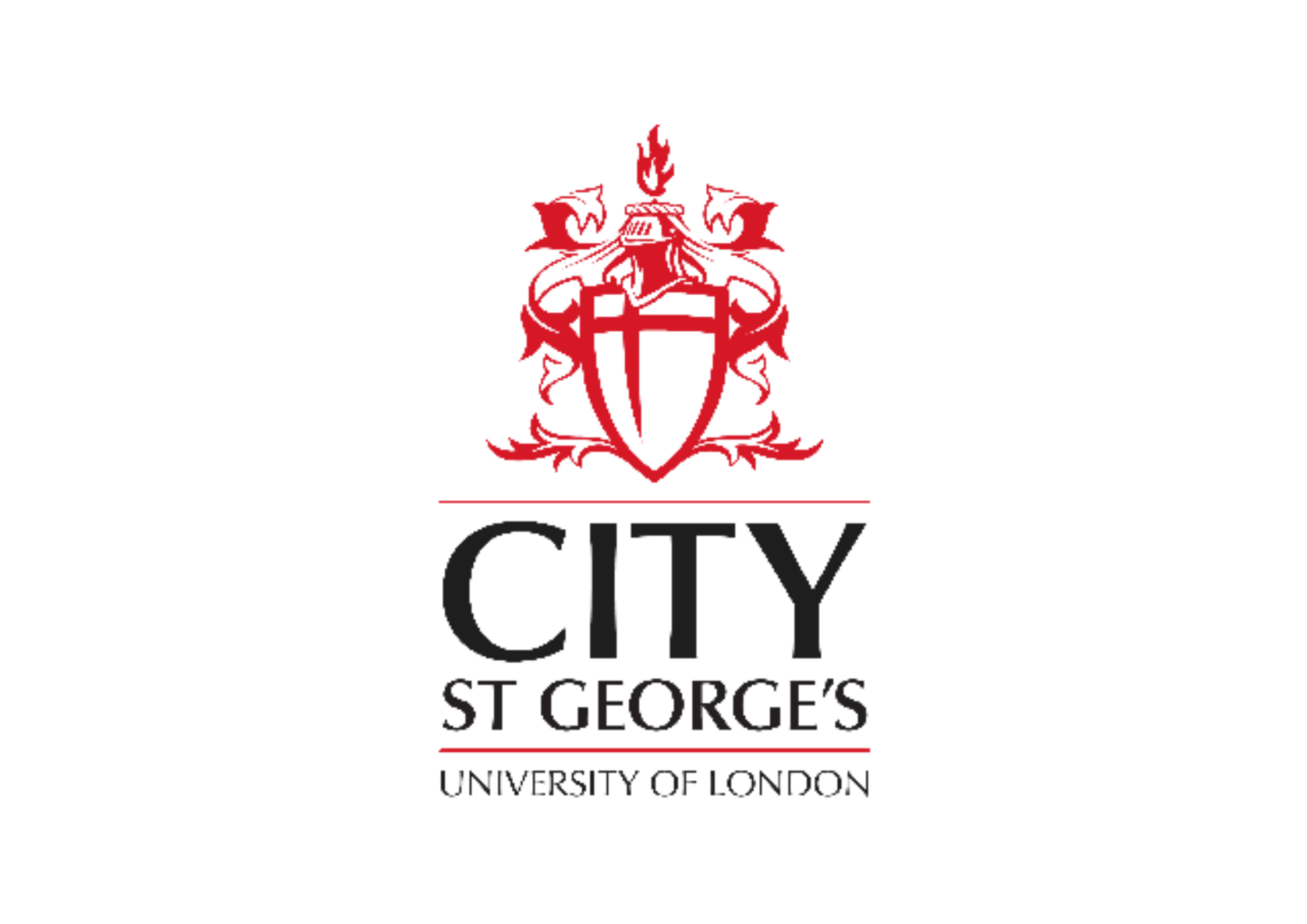
Engage on social media
(Official Twitter account)
(Official LinkedIn account)
(Official YouTube Account)
Summary
Key People

Albena Azmanova
Professor
Department of International Politics,
City University of London

James Galbraith
Professor
Lyndon B. Johnson School of Public Affairs and Department of Government,
University of Texas at Austin
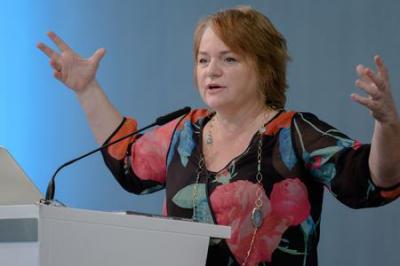
Kalypso Nicolaidis
Chair in Global Affairs
School of Transnational Governance ,
European University Institute

Alexandrina Najmowicz
Secretary General
European Civic Forum
Acknowledgements
I am grateful to Alexandrina Najmowicz, Secretary General of the Europan Civic Forum, for involving me in the work of the European Civic Academy, which has provided invaluable interactions that have enriched my understanding of precarity and helped me disseminate my research in civil society. I am also indebted to Professor James Galbraith for his help in enhancing the policy outreach of my research; our continuous exchanges are a source of intellectual insight and inspiration. My colleague Professor Kalypso Nicolaidis helped me see the value of my research at its very early stage; our conversations and collaborations have galvanised my thinking about the political implications of precarity.
Images
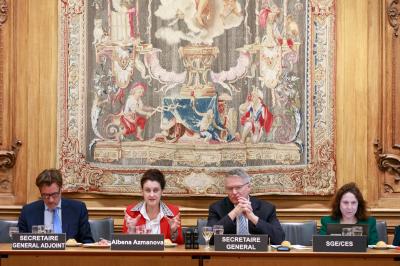
Azmanova speaks to OECD embassadors, Paris, 2 December 2022
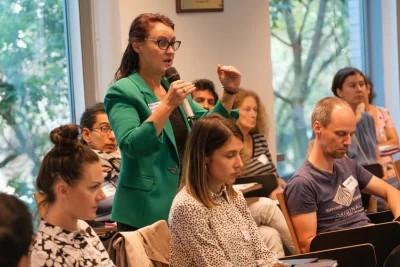
Azmanova speaks at the European Civic Academy, Brussels 19 September 2023
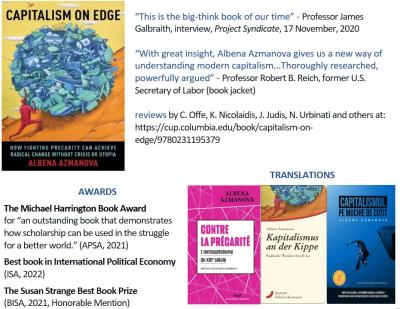
Awards for Azmanova's Capitalism on Edge
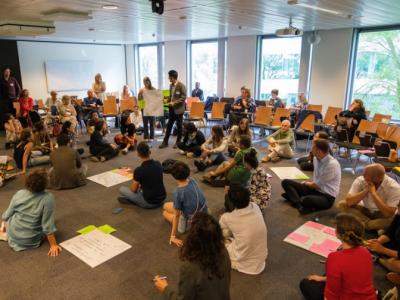
European Civic Academy, Brussels, 19-20 September 2023

Book Signing at Éditions du Seuil, Paris
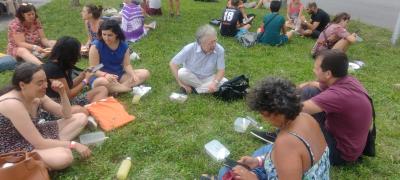
with comrades of the League des droits de l’Homme gathering, Paris, 25 Nov 2023
IMPACT STORY
Impacting lifes
In the autumn of 2023, I spoke about generalised precarity at the European Civic Academy – an annual gathering of representatives of over 100 associations and NGOs across 30 European countries that are members of the European Civic Forum. I pointed out that promises for inclusive prosperity and ecological sustainability are alienating people from democratic politics because such promises are implausible – people know that the ‘green transition’ is very costly and they cannot afford to care for the environment even as they worry about the ecological crisis. The solution, I suggested, is to replace the goal of inclusive prosperity with economic stability (secure incomes, solid public services, especially high quality and affordable healthcare) – a trade-off people are willing to make, according to my research. The response from civil society activists was enthusiastic, and surprising to me on one point. They thanked me for helping them put an end to the tensions between groups fighting for social justice (against poverty and inequality) and those advocating for ecological justice. I have presented this idea to many policy-makers and at many political fora – from the OECD to the European Parliament, and I have seen the thinking shift in this direction. But I believe transforming the competition among grassroots forces into an inspired cooperation is the one indispensable ingredient if our struggles for a better world are to stand any chance of success. My discussions with civil activists have further enriched my work on precarity. The impact has been mutual.
LEARNINGS
Lessons learned
I was schooled as a political theorist, yet I have produced research that has attracted the attention of economists and received awards for political economy. I believe this 'breakthrough' is due to the fact that my research has been driven by practical social concerns. Thus, I began convinced that it is economic insecurity, rather than inequality or impoverishment, that was working people's leading concern in Western societies when, twenty years ago, a group of parties at the European Parliament asked to research why the working classes were abandoning the left. Although I was neither an economist nor a specialist in electoral politics, I re-educated myself during my investigations. Practice is the best form of skill-building. Another of my surprising achievements is that one of my articles on precarity was included, in German translation, in a volume of ‘classical’ texts on socio-economic ethics, alongside works by Adam Smith, David Ricardo, G.W.F.Hegel, Karl Marx, John Stuart Mill, Rosa Luxemburg, Emil Durkheim, Albert Hirschman, Karl Polanyi and Amartya Sen (A. Honneth and L. Herzog, Der Wert des Marktes, Suhrkamp Verlag, 2014: https://www.suhrkamp.de/buch/der-wert-des-marktes-t-9783518296653). Before its publication in the journal New Political Economy, this article had been rejected by several academic journals, with editors noting that the way I mix economic analysis and philosophy is highly unorthodox, and advising me to eliminate either the economics or the philosophy -- something I refused to do. When you feel you have something important to say, find the best way of saying it, and don't waiver!
FUTURE PLANS
What's coming?My research on ubiquitous precarity has helped draw attention to this phenomenon and is affecting the political debates. Thus, in his testimony to U.S. Congress for the inauguration of the Select Committee on Economic Disparity and Fairness in Growth on July 29, 2021, James Galbraith drew on my analysis in urging the new Congressional Committee to focus not only on economic inequality, but also on economic insecurity. However, in contrast to inequality, precarity is difficult to detect and measure. So far, there is no econometric model allowing us to measure precarity – this is an obstacle for policy planning. I am currently working on assembling a team to help me develop such a model.

